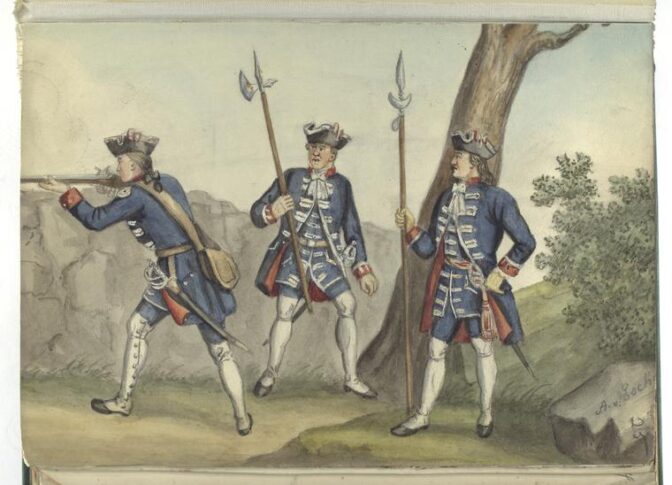I often get questions about finding military ancestors, and thought I would write a few posts about that. I will start with the early period, before 1795.
Before 1795, most soldiers were professional soldiers, not conscripts. The Dutch Republic (1588-1795) hired both Dutch and foreign men. Often, whole regiments were hired, including from Scotland, Switzerland, and Germany. The regiments would be stationed in garrison towns throughout the republic, changing every few years. Some soldiers married local women and continued to live in the Netherlands after their career was over.
Many officers were from noble or patrician families. The army was also an interesting career for Catholics, who were barred from high positions in civil society.
Researching military ancestors is difficult, especially if they were below the rank of officers. Tracing the commanding officer may help you to trace your ancestor.
Types of records
Marriage records
The marriage record is often the first hint you will get that an ancestor was in the military. Marriage records for soldiers often include their rank and name the regiment or commanding officer. Mr. Wolters made an index of military marriages in the various garrison towns. These have been digitized and are available via FamilySearch. Search the catalog for the name of the place and then select Military records.
Council of State records
The Raad van State [Council of State] was the equivalent of the modern Department of Defense, and responsible for hiring men. The records of the Council of State are kept at the National Archives in The Hague. Their records contain resolutions about appointments, muster rolls, pensions, etc, but they are very incomplete. Often, you will have to search by regiment. It is rare to find records for individual soldiers. The finding aid is available at the National Archives website and contains links to scans of some of the records. They are only partially indexed:
Provincial records
The provinces where the regiment was garrisoned often also recorded the commissions and pensions, usually only for officers. You will have to research what records survive for the particular province.
Town records
The records of the garrison towns may also provide information about soldiers. For example, there may be lists of payments for soldiers who were quartered in the town or correspondence about regiments that were stationed in the town.
Tips
- Military records are often organized by regiment or commanding officer. Try local records first to find out what regiment your ancestor belonged to, and who his commanding officer was.
- Search for commissions of the commanding officer or do a literature search into the regiment to see where your ancestor may have been earlier and later.
- You may find your ancestor had more children in the towns where the regiment was stationed before and after the place where you know he lived.
- You may find that your ancestor was originally signed up in one of the previous towns where they were stationed.
- Research local records to find other soldiers in the same regiment. You can search for them in other towns and then try and find your ancestor there.
- Use other genealogical records to get a more complete picture of your military ancestors’ life. See the pre-1800 cheat sheet for some ideas.
Links
- Delpher. The newspapers (Kranten) may list which regiment was garrisoned in a town.
- Image bank of the Netherlands Institute for Military History. This includes paintings of soldiers of different ranks and regiments.
- Vinkenhuijzen Collection of military uniforms at the New York Public Library.
- Dutch Regiments [archived]. This website has information about all the regiments and where they were stationed. The website is not available in its original place anymore, but was archived at the Internet Archive. Unfortunately, the search function does not work.

Fuseleers, 1701. Credits: Collection Vinkenhuijzen, NYPL, no. 91849 (public domain)


Yvette, thank you for this great article and all the resources. I also appreciate the history of the military for the period before 1795.